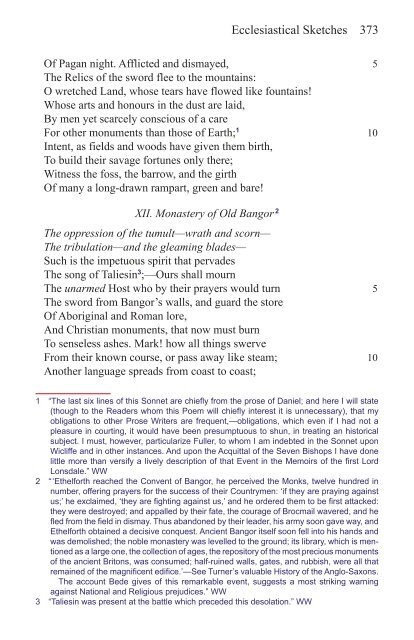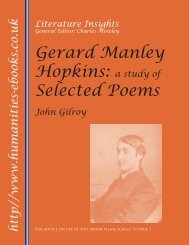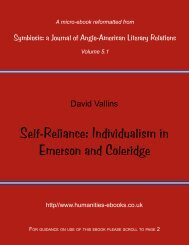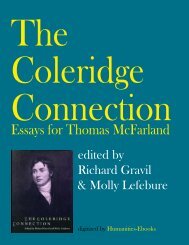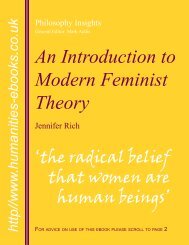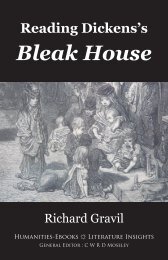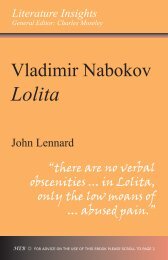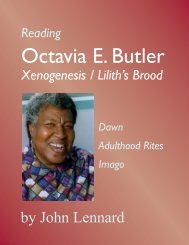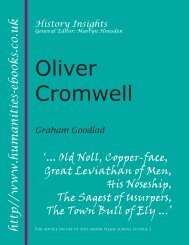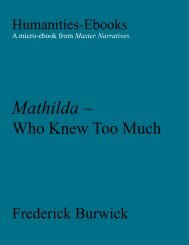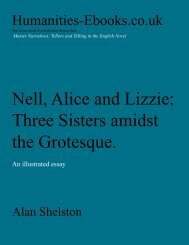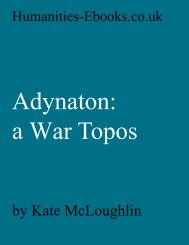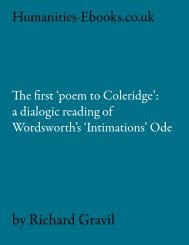The Poems of William Wordsworth - Humanities-Ebooks
The Poems of William Wordsworth - Humanities-Ebooks
The Poems of William Wordsworth - Humanities-Ebooks
You also want an ePaper? Increase the reach of your titles
YUMPU automatically turns print PDFs into web optimized ePapers that Google loves.
Ecclesiastical Sketches 373<br />
Of Pagan night. Afflicted and dismayed, 5<br />
<strong>The</strong> Relics <strong>of</strong> the sword flee to the mountains:<br />
O wretched Land, whose tears have flowed like fountains!<br />
Whose arts and honours in the dust are laid,<br />
By men yet scarcely conscious <strong>of</strong> a care<br />
For other monuments than those <strong>of</strong> Earth; 10<br />
Intent, as fields and woods have given them birth,<br />
To build their savage fortunes only there;<br />
Witness the foss, the barrow, and the girth<br />
Of many a long-drawn rampart, green and bare!<br />
XII. Monastery <strong>of</strong> Old Bangor <br />
<strong>The</strong> oppression <strong>of</strong> the tumult—wrath and scorn—<br />
<strong>The</strong> tribulation—and the gleaming blades—<br />
Such is the impetuous spirit that pervades<br />
<strong>The</strong> song <strong>of</strong> Taliesin ;—Ours shall mourn<br />
<strong>The</strong> unarmed Host who by their prayers would turn 5<br />
<strong>The</strong> sword from Bangor’s walls, and guard the store<br />
Of Aboriginal and Roman lore,<br />
And Christian monuments, that now must burn<br />
To senseless ashes. Mark! how all things swerve<br />
From their known course, or pass away like steam; 10<br />
Another language spreads from coast to coast;<br />
“<strong>The</strong> last six lines <strong>of</strong> this Sonnet are chiefly from the prose <strong>of</strong> Daniel; and here I will state<br />
(though to the Readers whom this Poem will chiefly interest it is unnecessary), that my<br />
obligations to other Prose Writers are frequent,—obligations, which even if I had not a<br />
pleasure in courting, it would have been presumptuous to shun, in treating an historical<br />
subject. I must, however, particularize Fuller, to whom I am indebted in the Sonnet upon<br />
Wicliffe and in other instances. And upon the Acquittal <strong>of</strong> the Seven Bishops I have done<br />
little more than versify a lively description <strong>of</strong> that Event in the Memoirs <strong>of</strong> the first Lord<br />
Lonsdale.” WW<br />
“ ‘ Ethelforth reached the Convent <strong>of</strong> Bangor, he perceived the Monks, twelve hundred in<br />
number, <strong>of</strong>fering prayers for the success <strong>of</strong> their Countrymen: ‘if they are praying against<br />
us;’ he exclaimed, ‘they are fighting against us,’ and he ordered them to be first attacked:<br />
they were destroyed; and appalled by their fate, the courage <strong>of</strong> Brocmail wavered, and he<br />
fled from the field in dismay. Thus abandoned by their leader, his army soon gave way, and<br />
Ethelforth obtained a decisive conquest. Ancient Bangor itself soon fell into his hands and<br />
was demolished; the noble monastery was levelled to the ground; its library, which is mentioned<br />
as a large one, the collection <strong>of</strong> ages, the repository <strong>of</strong> the most precious monuments<br />
<strong>of</strong> the ancient Britons, was consumed; half-ruined walls, gates, and rubbish, were all that<br />
remained <strong>of</strong> the magnificent edifice.’—See Turner’s valuable History <strong>of</strong> the Anglo-Saxons.<br />
<strong>The</strong> account Bede gives <strong>of</strong> this remarkable event, suggests a most striking warning<br />
against National and Religious prejudices.” WW<br />
“Taliesin was present at the battle which preceded this desolation.” WW


